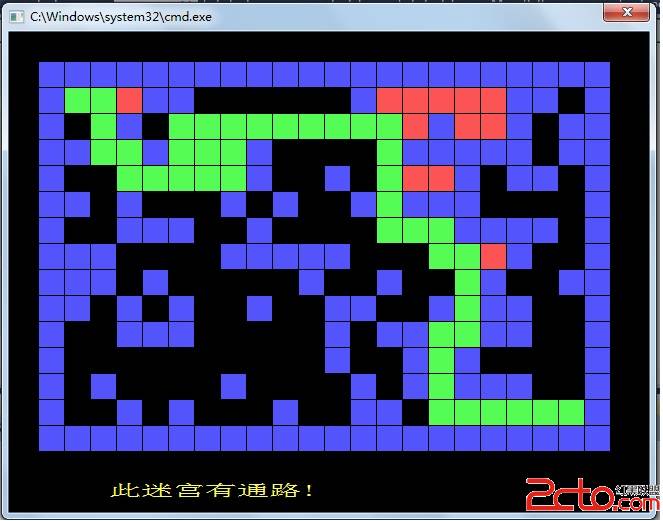[cpp
sqStack.h
#include "selemtype.h"
#define MaxSize 1000
typedef struct
{
SElemType data[MaxSize];
int top;
}Stack;
Status InitStack(Stack &S);
Status DestroyStack(Stack &S);
Status StackEmpty(Stack &S);
Status Push(Stack &S,SElemType &e);
Status Pop(Stack &S,SElemType &e);
[cpp] view plaincopy
sqStack.cpp
#include "sqstack.h"
#include<iostream>
using namespace std;
Status InitStack(Stack &S)
{
S.top = 0 ;
for( int i = 0 ; i < MaxSize ; i++ )
{
S.data[i].di = 0 ;
S.data[i].ord = 0 ;
S.data[i].seat.c = 0;
S.data[i].seat.r = 0;
}
return true;
}
Status DestroyStack(Stack &S)
{
S.top = 0 ;
return true;
}
Status StackEmpty(Stack &S)
{
bool judger = false ;
if(S.top == 0)
judger = true;
return judger;
}
Status Push(Stack &S,SElemType &e)
{
bool judger = false;
if(S.top < MaxSize)
{
S.data[S.top] = e ;
S.top++;
judger = true ;
}
return judger;
}
Status Pop(Stack &S,SElemType &e)
{
bool judger = false ;
if(S.top > 0)
{
S.top--;
e = S.data[S.top] ;
judger = true ;
}
return judger;
}
[cpp]
Mazepath.h
#define N 15
#define M 22
//分割塊占總空間比例
#define V 0.4
typedef struct ElemType
{
int x,y;
char c;
}ElemType;
typedef struct MazeType
{
ElemType arr[N][M];
}MazeType;
Status Pass(MazeType &MyMaze, PosType CurPos);
void FootPrint(MazeType &MyMaze, PosType CurPos);
void MarkPrint(MazeType &MyMaze, PosType CurPos);
PosType NextPos(PosType CurPos, int Dir);
Status MazePath(MazeType &maze, PosType start, PosType end);
[cpp]
Mazepath.cpp
/*------------------------------------------------
走迷宮算法v1.0
N 迷宮行數
M 迷宮列數
V 分割塊占總空間比例
ElemType 迷宮元素類型
MazeType 迷宮類型
函數MazePath 走迷宮算法
函數Pass 判斷當前位置是否可通過
函數FootPrint 留下足跡
函數MarkPrint 留下不能再走的標記
函數NextPos 計算下一位置
-------------------------------------------------*/
#include "MazePath.h"
Status MazePath(MazeType &maze, PosType start, PosType End)
{
// 算法3.3
// 若迷宮maze中從入口 start到出口 end的通道,則求得一條存放在棧中
// (從棧底到棧頂),並返回TRUE;否則返回FALSE
Stack stack; //定義一個棧
InitStack(stack); //初始化該棧
int count = 0 ; //用來記錄通道塊的序號
PosType nextPos = start,curPos = start;
SElemType e,pe;
pe.di = 0;
int di = 0 ;
bool judger = true ;
bool uu = true;
while(true)
{
for(int i = 1 ; i <= 4 ; i++ )
{
nextPos = NextPos(curPos,i);
if(Pass(maze,nextPos))
{
count++;
e.seat = curPos ;
e.ord = count;
e.di = i ;
FootPrint(maze,curPos);
Push(stack, e);
curPos = nextPos ;
judger = true ;
if(curPos.c==End.c&&curPos.r==End.r)
{
count++;
e.seat = curPos ;
e.ord = count;
e.di = i ;
FootPrint(maze,curPos);
Push(stack, e);
return true ;
}
break;
}
if(i == 4)
{
if(judger) //走投無路時將最後一個通道塊壓入棧
{
count++;
e.seat = curPos ;
e.ord = count;
e.di = i ;
FootPrint(maze,curPos);
Push(stack, e);
judger = false;
if(curPos.c==End.c&&curPos.r==End.r)
return true ;
}
Pop(stack , pe); //出棧
curPos = pe.seat ;
MarkPrint(maze , pe.seat); //標記為走過且不可走
if(stack.top == 0)
return false;
break;
}
}
}
} //MazePath
Status Pass( MazeType &MyMaze,PosType CurPos)
{
if (MyMaze.arr[CurPos.r][CurPos.c].c==' ')
return 1; // 如果當前位置是可以通過,返回1
else return 0; // 其它情況返回0
}
void FootPrint(MazeType &MyMaze,PosType CurPos)
{
//循環是判斷全局線程互斥變量的值,等待走步,
//值為false,迷宮走步,並重新設為true,交給
//主線程繪制,子線程等待
while(drawflag)
;
drawflag=true;
MyMaze.arr[CurPos.r][CurPos.c].c='*';
}
void MarkPrint(MazeType &MyMaze,PosType CurPos)
{
//循環是判斷全局線程互斥變量的值,等待走步,
//值為false,迷宮走步,並重新設為true,交給
//主線程繪制,子線程等待
while(drawflag)
;
drawflag=true;
MyMaze.arr[CurPos.r][CurPos.c].c='!';
}
PosType NextPos(PosType CurPos, int Dir)
{
PosType ReturnPos;
switch (Dir)
{
case 1:
ReturnPos.r=CurPos.r;
ReturnPos.c=CurPos.c+1;
break;
case 2:
ReturnPos.r=CurPos.r+1;
ReturnPos.c=CurPos.c;
break;
case 3:
ReturnPos.r=CurPos.r;
ReturnPos.c=CurPos.c-1;
break;
case 4:
ReturnPos.r=CurPos.r-1;
ReturnPos.c=CurPos.c;
break;
}
return ReturnPos;
}
[cpp] view plaincopy
selemtype.h
#pragma once
#define Status bool
#define TRUE true
#define FALSE false
struct PosType
{
int r,c; //行列 or xy
};
typedef struct
{
int ord; //通道塊在路徑上的序號
PosType seat; //通道塊在迷宮中的坐標位置
int di; //從此通道塊走向下一通道塊的方向
}SElemType;
extern bool drawflag; //全局變量外部聲明
[cpp]
main.cpp
#include <iostream>
using namespace std;
#include "graphics.h"
#include <time.h>
#include "mazepath.h"
/*------------------------------------------------
走迷宮游戲v1.0
屏幕大小: 640*480
Width 每個小方塊寬度
Space 每個小方塊間隔
Step 每塊占據象素
drawflag 線程互斥全局變量,為true畫圖,
為false走迷宮
threadflag 判斷線程是否結束的全局變量,為false
線程結束,程序結束
maze; 迷宮全局對象
start,end 迷宮起終點全局變量
函數InitMaze 初始化迷宮
函數RandmMaze 隨機生成迷宮
函數DrawMaze 繪制迷宮
函數ThreadMazePath 子線程函數,調用走迷宮函數修
改迷宮對象數據
算法設計思想
數據結構: 迷宮每個元素由位置坐標x,y和是否可走
的狀態c構成,x、y代表畫塊的左上角坐
標,c為#是障礙,為空格是空位,為!
是已走過且不能再走,為*是走過且還有
選擇;
基本操作: 棧的初始化、銷毀、入棧、出棧等;
繪制迷宮操作: 在主線程中繪制,根據元素值c選擇不同
顏色繪制,根據元素值x、y,確定繪制
位置;
走迷宮操作: 在子線程中計算迷宮對象走動的每一步,
修改迷宮對象的值,但不繪制迷宮,通
過修改互斥變量drawflag的值,在兩個
線程中交替進行繪制和走步。
-------------------------------------------------*/
#define Width 24
#define Space 2
#define Step (Width + Space)
bool drawflag=true;
MazeType maze;
PosType start,End;
bool threadflag=true;
void InitMaze(MazeType &maze)
{
//初始化迷宮,將二維數組的每個元素計算出屏幕坐標
int i,j;
for(i=0;i<N;i++)
for(j=0;j<M;j++)
{
maze.arr[i][j].x=30+j*Step;
maze.arr[i][j].y=30+i*Step;
}
}
void RandmMaze(MazeType &maze,PosType start,PosType end)
{
//隨機生成迷宮,在二維數組內除起終點外其余位置隨
//機生成障礙,障礙數量按比例V計算
int i,j,k,num;
//邊界和空位初始化
for(i=0;i<N;i++)
{
maze.arr[i][0].c='#';
maze.arr[i][M-1].c='#';
if(i!=0&&i!=N-1)
{
for(j=1;j<M-1;j++)
{
maze.arr[i][j].c=' ';
}
}
}
for(i=1;i<M-1;i++)
{
maze.arr[0][i].c='#';
maze.arr[N-1][i].c='#';
}
//按分割塊占總空間比例隨機生成迷宮
num=(N-2)*(M-2)*V; //計算需要的分割塊數量
maze.arr[start.r][start.c].c='#'; //為了隨機生成分割塊不占用起始和終止位置
maze.arr[end.r][end.c].c='#';
k=num;
while(k>1)
{
i=rand()%(N-2)+1;j=rand()%(M-2)+1;
if(maze.arr[i][j].c==' ')
maze.arr[i][j].c='#';
k--;
}
maze.arr[start.r][start.c].c=' ';
maze.arr[end.r][end.c].c=' ';
}
void DrawMaze(MazeType &maze)
{
//繪制迷宮,按不同狀態繪制不同顏色方塊
int i,j;
for(i=0;i<N;i++)
{
for(j=0;j<M;j++)
{
switch(maze.arr[i][j].c)
{
case '#': //障礙塊
setfillstyle(SOLID_FILL,LIGHTBLUE);
break;
case '!': //已走過且無路可走的塊
setfillstyle(SOLID_FILL,LIGHTRED);
break;
case '*': //走過的塊
setfillstyle(SOLID_FILL,LIGHTGREEN);
break;
case ' ': //空閒塊
setfillstyle(SOLID_FILL,BLACK);
break;
}
bar(maze.arr[i][j].x,maze.arr[i][j].y,maze.arr[i][j].x+Width,maze.arr[i][j].y+Width);
}
//cout<<endl;
}
}
DWORD WINAPI ThreadMazePath(LPVOID plParameter)
{
//子線程函數,調用走迷宮函數修改迷宮對象數據
//迷宮無解再生成新迷宮,直到有解
int k=1;
srand(time(0));
RandmMaze(maze,start,End); //隨機生成迷宮
while(!MazePath(maze,start,End))
{
cout<<"第"<<k<<"個迷宮無解!"<<endl;
getchar();
InitMaze(maze);
RandmMaze(maze,start,End);k++;
}
cout<<"第"<<k<<"個迷宮有解!"<<endl;
setfillstyle(SOLID_FILL,BLACK);
bar(100,450,500,480);
setcolor(YELLOW);
SetFont(16,16,0,0,0,FALSE,FALSE,FALSE,"宋體"); //文字設為宋體
outtextxy(100,450,"此迷宮有通路!");
threadflag=false; //線程結束標記
return 0;
}
void main()
{
//初始化圖形界面
initgraph(640,480);
//清屏
cleardevice();
//默認全局變量為true
drawflag=true;
threadflag=true;
InitMaze(maze); //初始化迷宮對象
start.r=start.c=1; //初始化起終點
End.r=N-2;End.c=M-2;
//創建走迷宮數據計算子線程
HANDLE hThread1=CreateThread(NULL,
0,ThreadMazePath,NULL,0,NULL);
while(threadflag) //子線程未結束
{
Sleep(100);
if(drawflag) //線程互斥變量為真,畫圖,否則等待迷宮走完一步
{
DrawMaze(maze);
drawflag=false; //畫完一步,置為假,迷宮數據計算子線程走下一步
}
}
//結束前任意鍵暫停
getchar();
//關閉圖形界面
closegraph();
}
